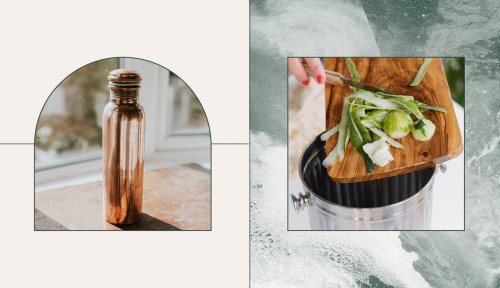Our editors independently select these products. Making a purchase through our links may earn Well+Good a commission
I Tapped a Sustainability Coach To Nix My Trashy Habits—Here Are the 5 Key Takeaways I’ll Be Trying
Sustainability expert Megean Weldon, the “Zero Waste Nerd” shares her tips for creating less waste this Earth Month.

After tracking my trash for two weeks as a part of the Waste Not Challenge, I came to a few important realizations: I collect a problematic amount of cardboard, I have a terrifying paper towel habit, and I apparently know next-to-nothing about waste management. As someone who’s always thought of herself as sustainable, this was a pretty major wake-up call.
Experts in This Article
Megean Weldon is a sustainable lifestyle coach and blogger behind “Zero Waste Nerd”.
In an effort to clean up some of my trashy habits, I met with Megean Weldon, a sustainable lifestyle expert, blogger, and author of An (Almost) Zero Waste Life ($10). Throughout the years, Weldon has challenged herself to adopt a “zero waste” lifestyle as much as possible, encouraging others to cut down on their waste and minimize their impact on Earth along the way.
Over Zoom, I shared my sustainability concerns with Weldon—particularly regarding how much waste I create in my job as a commerce writer and how I feel like a recycling ignoramus. “Recycling is way more complicated in this country than it needs to be. It’s not black and white,” she says. “And you can’t strive for ‘zero’ waste—you have to start small, be gentle with yourself, and be like, ‘Okay, what [sustainable changes] am I going to focus on now?’ so you don’t get overwhelmed.”
Oh, I was definitely overwhelmed. Lucky for me, I had the right coach—below are some of Weldon’s tips for cutting down on waste I’ll be applying, and you can too.

5 easy tips for a more sustainable lifestyle
1) Buy what you need
The most important thing you can do to live an eco-friendlier life, says Weldon, is simple: Cut back on consumption. Think hard about what you’re spending money on, and the Earth (and your wallet!) will thank you.
“I’m a firm believer that over-consumption is the primary contributor to why we’re in the position we’re in with our sustainability problem,” she says. All the packaging, the boxes in boxes, the empty bottles, the paper waste—it adds up with every purchase. The best way to mitigate waste is to limit how much you make in the first place.
Now, before you cut up your credit card, Weldon has a simple trick when you’re stocking up your shopping cart with little luxuries. Stop and ask yourself, “How will this make me feel in 10 days, 10 months, and 10 years?” So, will that trendy pair of shoes really last more than one season, or will they be out of style by Spring? Posing this simple question will put purchases into new perspective.
2) Learn your local regulations
I wasn’t imagining things when I wrote that no one *really* knows how to recycle. That’s because there’s no single, uniform way our entire country handles waste. Every individual municipality across America has its own set of rules when it comes to what waste they take and what they do with it, which, surprise, surprise—can get confusing.
Weldon says there’s an easy solution: do your research. “Get ahold of your local recycling center. They probably have a website that will list everything they take,” she says. “I live in a suburb of Kansas City, and there are things mine will take that another suburb next door won’t, and vice versa. So get that list because that will be your roadmap.”
3) Composting is your BFF
Cardboard is a major waste contributor of mine thanks to the number of product samples I receive. When I’m not recycling it, Weldon suggests composting it, along with any other food and paper waste I create. Turns out, two-thirds of our waste is organic. If you can find a way to compost that trash? You’ve just eliminated two-thirds of your waste. (While making a personalized patch of fertilizer your plant babies will love, nonetheless.)
And no, you don’t need a sprawling backyard to start your own compost pile. If you live in a city and are short on space, invest in a compost bin and do your homework—chances are, there’s a local composting program where you can drop off the goods. There’s even an app called ShareWaste that literally connects you with neighbors who have gardens or farms. Sign up, meet your trashy match, and get to composting.
4) Make easy, cost-effective switches
Rather than dropping money on the latest-and-greatest in sustainable products (aka buying more *stuff*), Weldon suggests starting by switching a few easy disposables with affordable reusables. “Instead of paper napkins, go to the thrift store and buy some cotton napkins. Or rip up an old T-shirt to use as rags,” she says. “Buy bars of soap instead of liquid… if you’re really overzealous, try making your own.”
Some other cost-effective suggestions from Weldon’s blog:
- Reusable cotton rounds
- Solid dish soap
- Reusable shopping bags
- Food jars as Tupperware
- Wax wraps as plastic wrap
- Dryer balls
5) Take your habits on the road
One of my original trash-tracking takeaways was that many of my unsustainable habits were happening because I was out of my normal element (I’m spending a few months living in an AirBnB in Salt Lake City instead of at home in Lake Placid). I’ve admittedly become more wasteful because I forgot to pack eco-friendly necessities (my filtered water pitcher, coffee pot, refillable beauty products).
Before you go on the road, Weldon suggests doing your homework on where you’re going so you can pack accordingly. For example, had I done this myself and known that the water quality in Salt Lake City was suspect, I would have packed my filtered water pitcher. Or if I knew there was going to be a Keurig in our rental, I would have brought a reusable K-cup. “Bring as much stuff with you from home as you can,” Weldon says.
And of course, if you can’t fit your favorite water pitcher or coffee pot on a plane, look for simple ways to reduce waste on the road. Take water, for example—Weldon suggests going to a refillable drinking water station or buying a pack of charcoal water filters that will clean your tap water. Bring your own cutlery so you don’t have to use plastic, and don’t be afraid to tell the person wrapping your Subway sandwich you don’t need those six pieces of paper—one will suffice.
“Look at options on the road that come in less packaging,” she says. “And know ahead of time what you’ll have access to—what bulk stores, what health food or refill shops are around you, what the location’s composting and recycling situation is like ahead of time so you can plan around that.”
Oh hi! You look like someone who loves free workouts, discounts for cutting-edge wellness brands, and exclusive Well+Good content. Sign up for Well+, our online community of wellness insiders, and unlock your rewards instantly.
Sign Up for Our Daily Newsletter
Get all the latest in wellness, trends, food, fitness, beauty, and more delivered right to your inbox.
Got it, you've been added to our email list.








